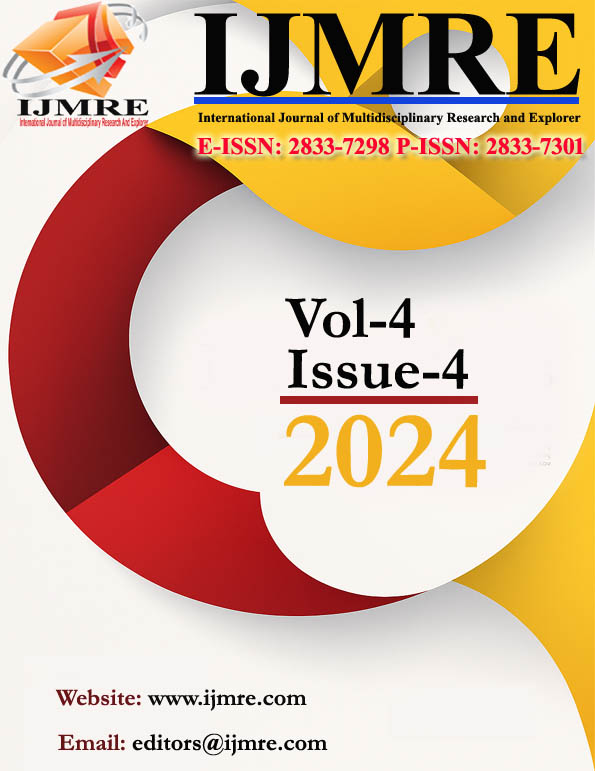Effect of Kagan Cooperative Learning Structures on Learning Achievement: An Experimental Study
DOI:
https://doi.org/10.70454/IJMRE.2024.40405Keywords:
learning achievement, chemistry, Kagan cooperative learning structures, Bhutan, middle secondary schoolAbstract
This study aimed to explore the effect of Kagan cooperative learning structures in enhancing the learning achievement of the Bhutanese students in learning chemistry. This was experimental research, pretest – posttest control group design. A total of 76 higher secondary students from Daga Central School participated in this research. Samples were obtained through purposive sampling. The participants were divided into two groups namely, control group (n = 38) and experimental group (n = 38). The Experimental group was taught using Kagan cooperative learning structures whereas control group was taught using conventional method (lecture method) for four weeks. Achievement test were administered before and after the intervention. Data were analyzed by computing means, standard deviations and t-test. The results of the study showed statistically significant difference in achievement between groups taught using Kagan cooperative learning structures and those taught via conventional method with moderate effect size (d = 0.63), suggesting Kagan cooperative learning structures as effective pedagogical approach in learning chemistry in Bhutanese higher secondary schools.References
[1] Almala, A. H. (2005). A constructivist conceptual framework for a quality e-learning environment. Distance Learning, 2(5), 9-12.
[2] Bandura, A. (1977). Social learning theory. General Learning Press.
[3] Bandura, A. (1986). Social foundations of thought and action: A social cognitive theory. Prentice-Hall.
[4] Bhutan Council for school examination and assessment (BCSEA). (2019). Findings from Bhutan’s experience in PISA for Development (PISA-D). http://www.education.gov.bt/wp content/downloads/publications/other/Bhutan-PISA-D-National Report.pdf
[5] Burkich, S. (2006). Anderson County teachers excel with Kagan. https://www.kaganonline.com/free_articles/research_and_rationale/3 05/Anderson-County-Teachers-Excel-with-Kagan
[6] Davoudi, A., & Mahinpo, B. (2012). Kagan cooperative model: The bridge of foreign language learning in the third millennium. Theory and Practice in Language Studies, 2(6), 1134-1140.
[7] Deutsch, M. (1949). A theory of cooperation and competition. Human Relations, 2, 129–152.
[8] Dorji, J. (2005). Quality of education in Bhutan: The story of growth and change in the Bhutanese education system. KMT Publishers.
[9] Dotson, J. M. (2001). Cooperative learning structures can increase student achievement. https://www.kaganonline.com/free_articles/research_and_rationale/i ncrease_achievement.php
[10] Fanolong, F., Bugis, R., Azwan, A., Hanapi, H., & Handayani, N. (2016). The students' reading ability improvement through numbered head together (NHT) technique. Jurnal Jupiter, 14(2), 67-78.
[11] Farmer, L. M. (2017). Kagan Cooperative Learning Structures and the Effects on Student Achievement and Engagement (Corpus ID: 54556502) [Master’s theses & Capstone Projects, Northwestern College]. https://nwcommons.nwciowa.edu/cgi/viewcontent.cgi?article=1048 &context=education_masters
[12] Gliner, J. A., Morgan, G. A., & Harmon, R. J. (2003). Pre-test-post test comparison group designs: Analysis and interpretation. American academy of child &adolescent psychiatry, 42(4), 500-503.
[13] Heusman, S., & Moenich, D. (2003). Achievement still on the rise at Catalina Ventura school. https://www.kaganonline.com/free_articles/research_and_rationale/3 04/Achievement-Still-on-the-Rise-At-Catalina-Ventura-School
[14] Hinson, T. (2015). Perceptions on Cooperative Learning: A case study of Kagan cooperative learning structures in the classroom [Doctoral Dissertation, East Carolina University]. https://thescholarship.ecu.edu/bitstream/handle/10342/4862/HINSO N-DOCTORALDISSERTATION-2015.pdf?sequence=1
[15] Johnson, D. W. (2003). Social Interdependence: Interrelationships among theory, research, and practice. American Psychologist, 58(11), 934–945.
[16] Johnson, D. W., & Johnson R. T. (1999). Learning together and alone: Cooperative, competitive, and individualistic learning. Allyn and Bacon.
[17] Kagan, S. (1994). Cooperative Learning. Kagan Publishing
[18] Kagan, S., & Kagan, M. (2009). Kagan Cooperative learning. Kagan Publishing.
[19] Mcleod, S. (2019, July 10). Effect Size. Simplypsychology.org. https://www.simplypsychology.org/effect-size.html
[20] Mele, A., J., & Kagan, S. (2001). Cooperative learning creates explosive results in high school chemistry. https://www.kaganonline.com/free_articles/research_and_rationale/3 21/Kagan-Cooperative-Learning-Creates-Explosive-Results-in- High-School-Chemistry
[21] Nursyamsi, S. Y., & Aloysius, D. C. (2016). The Effect of Numbered Heads Together (NHT) Learning strategy on the retention of senior high students in Muara Badak, East Kalimantan, Indonesia. European Journal of Education Studies, 2(5), 47-58.
[22] Rabgay, T. (2018). The effect of using cooperative learning method on tenth grade students’ learning achievement and attitude towards biology. International Journal of Instruction, 11(2), 265-280. https://doi.org/10.12973/iji.2018.11218a
[23] Ragusa, M. C. (2013). The Effects of Using Cooperative Learning Structures in a High School Chemistry Classroom [Master Thesis, Montana State University]. https://scholarworks.montana.edu/xmlui/bitstream/handle/1/2845/Ra gusaM0813.pdf?sequence=1
[24] Royal Education Council (2009). The quality of school education in Bhutan-Reality and opportunities. Center for Educational Research & Development, 2, 189-192. https://www.pce.edu.bt/wp content/uploads/2019/07/Quality-of-Education-II.pdf
[25] Sabbah, S. S. (2016). The effect of Jigsaw strategy on ESL students’ reading achievement. Arab World English Journal, 7(1), 445-458.
[26] Slavin, R. E. (1991). Synthesis of research on cooperative learning. Educational Leadership, 48, 71-82.
[27] Singay. (2020). An investigation into using Kagan cooperative learning model to enhance English oral communication ability of Bhutanese students. PASSA: A journal of language teaching and learning, 59, 20-47.
[28] Tran, V. D. (2013). Theoretical perspectives underlying the application of cooperative learning in classrooms. Inte
[29] Utha, K., Giri, K., Gurung, B., Giri, N., Kjær-Rasmussen, L. K., Keller, H. D., Willert, S., & Keller, K. D. (2016). Quality of school education in Bhutan: Case studies in the perspective of gross national happiness and assessment practices. Aalborg University Press.
[30] Vygotsky, L. S. (1978). Mind in society: The development of higher psychological processes. Harvard University Press.
[31] Wangdi, T. (2016, July 7). Teachers introduced to transformative pedagogy. Kuensel. https://kuenselonline.com/teachers-introduced to-transformative-pedagogy/
[32] Winters, M. (2013). Becoming exemplary with Kagan. https://www.kaganonline.com/free_articles/leadership_library/371/B ecoming-Exemplary-with-Kagan
Downloads
Published
Issue
Section
License
Copyright (c) 2024 Yonten Chophel (Author)

This work is licensed under a Creative Commons Attribution 4.0 International License.
This is an Open Access article distributed under the term's of the Creative Common Attribution 4.0 International License permitting all use, distribution, and reproduction in any medium, provided the work is properly cited.







